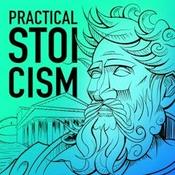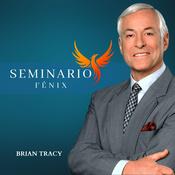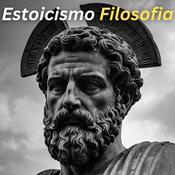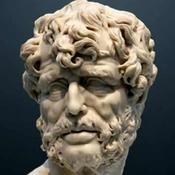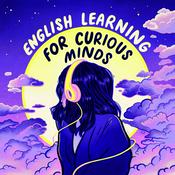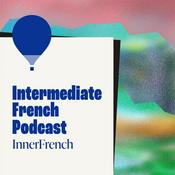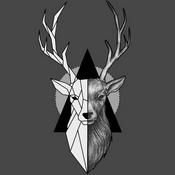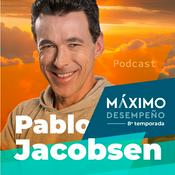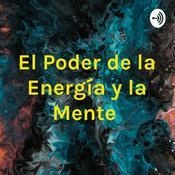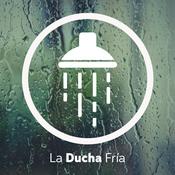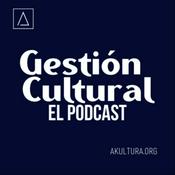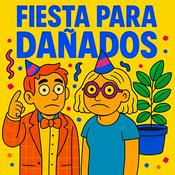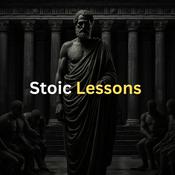328 episodios
- Subscribe to the FREE Stoic Brekkie newsletter: https://stoicbrekkie.com
I am a public philosopher. I am enabled to do this job, in large part, thanks to support from my listeners and readers. You can support my work, and keep it independent and online, at https://stoicismpod.com/members
In this episode, I respond to a short clip discussing incest as an example of emotivism in meta-ethics. Emotivism claims that when we say something is wrong, we are not stating a fact but expressing disapproval. The suggestion in the clip is that incest may ultimately be “wrong” only because we feel that it is wrong.
I take that seriously. It is true that many people struggle to articulate why incest is objectively wrong beyond saying it feels disgusting. And philosophers should care about that. If something is wrong, we should be able to explain why in rational terms.
Using Stoic role ethics, I outline a clear argument. In Stoicism, some roles are grounded in nature. These roles are not arbitrary. They come with built-in functions and ends. The sibling role is ordered toward familial care, trust, and cooperative development within the household. It is explicitly non-erotic because its function is to stabilize kinship bonds. The lover role, by contrast, is ordered toward erotic partnership and exclusivity.
When a person attempts to merge these roles, they introduce incompatible aims into a single relationship. Stoic role ethics holds that voluntarily chosen roles must not contradict natural ones. If they do, one role must be abandoned. Because the sibling role is grounded in nature, it cannot be abandoned without corrupting its function. Adopting the lover role toward a sibling therefore represents a rational error. It makes both roles impossible to fulfil properly.
This means the wrongness is not based on disgust. It is based on contradiction within the structure of human roles and the failure to live coherently within them. Stoicism does not reduce morality to feeling. It grounds moral judgment in reason, nature, and the proper fulfilment of roles within the human community.
I also explain why this matters more broadly. If moral claims are reduced to preference or emotion, then they shift with culture, fashion, or mood. Stoicism resists that instability by anchoring ethics in a rational framework. That framework may be debated, refined, or defended, but it is not merely expressive.
The point is simple: saying something “feels wrong” is not the same as explaining why it must be wrong. Philosophy should move us from reaction to reason.
Listening on Spotify? Leave a comment! Share your thoughts.
Podcast artwork by Original Randy: https://www.originalrandy.com
Learn more about your ad choices. Visit megaphone.fm/adchoices - I am a public philosopher, it is my only job. I am enabled to do this job, in large part, thanks to support from my listeners and readers. You can support my work, keep it independent and online, at https://stoicismpod.com/members
Looking for more Stoic content? Consider my 3x/week newsletter "Stoic Brekkie": https://stoicbrekkie.com
In this episode, I take up a question that seems settled, orthodox, and uncontroversial: can indifferents be preferred or dispreferred? Most Stoics would say yes and move on. But there is a serious ancient challenge to that position, and understanding it matters more than most people realize.
I begin with the standard Stoic account, drawing on Zeno as recorded by Stobaeus and Cicero. Virtue alone is good, vice alone is bad, and everything else is indifferent. Still, some indifferents are naturally preferred or rejected because they align with our rational nature. Health, social cooperation, and material sufficiency are not goods, but they are “according to nature.”
I then introduce the provocateur: Ariston of Chios. Ariston rejects the very idea of preferred and dispreferred indifferents. In his view, calling something a preferred indifferent is just calling it a good under another name. For Ariston, everything between virtue and vice is radically neutral, and any preference only arises situationally, never because the thing itself has standing within nature.
I explain why this disagreement is not merely semantic. Ariston’s position is inseparable from his rejection of Stoic physics and logic. Once those are removed, there is no rational structure of nature to ground stable preferences. Ethics collapses into a stark minimalism where virtue alone matters and everything else is interchangeable depending on circumstance.
This is why later Stoics saw Ariston as a dead end rather than a reformer. Without physics and logic, Stoic ethics loses its ability to guide action across time, roles, and recurring human situations. The philosophy becomes thinner, not sharper.
Finally, I connect this ancient dispute to a modern problem. Contemporary Stoicism often tries to keep the ethics while quietly discarding the physics and logic as unnecessary or outdated. That move repeats Ariston’s mistake. Stoicism can evolve, but it cannot survive if its foundations are simply removed without replacement. You cannot pull the columns out from under the Stoa and expect the roof to hold.
If we want Stoicism to remain coherent, actionable, and philosophically serious, we need to understand why preferred indifferents exist and what architectural commitments make them possible in the first place.
Listening on Spotify? Leave a comment! Share your thoughts.
Podcast artwork by Original Randy: https://www.originalrandy.com
Learn more about your ad choices. Visit megaphone.fm/adchoices - I am a public philosopher, it is my only job. I am enabled to do this job, in large part, thanks to support from my listeners and readers. You can support my work, keep it independent and online, at https://stoicismpod.com/members
Looking for more Stoic content? Consider my 3x/week newsletter "Stoic Brekkie": https://stoicbrekkie.com
Musonius Rufus Discourse 12: https://archive.org/details/MUSONIUSRUFUSSTOICFRAGMENTS
In this episode, I respond to a candid listener email asking about the Stoic position on sex work. The question is not framed with hostility or judgment, and for that reason I take it seriously. This is not an episode condemning women, sex workers, or anyone’s personal choices. It is an attempt to think clearly and Stoically about consent, justice, harm, and choice.
I begin by clarifying what the listener is actually asking. He is not asking whether men are wrong to engage sex workers, but whether women selling sex is unjust from a Stoic perspective. That distinction matters. Stoicism is not interested in purity rules or guilt. It is interested in whether actions are chosen rationally, freely, and without injustice.
I then address my own bias. I do not like sex work as a practice, largely because I am skeptical that it is ever entirely free from coercion, manipulation, or long-term harm. I make that bias explicit so it can be accounted for rather than hidden. A Stoic answer requires setting personal discomfort aside and asking whether something is unjust, not whether it feels distasteful.
To explore the classical position, I turn to Musonius Rufus and his extremely restrictive views on sex. Musonius argues that sex is only justified within marriage and only for procreation. I explain why I find this position impractical, overly rigid, and inconsistent with the rest of Stoic ethics. Stoicism is about rational choice, not outcome fixation, and reducing sex to reproduction ignores human health, intimacy, and context.
From there, I outline what Stoicism actually cares about. Sex is unjust only when it involves harm, coercion, deception, addiction, or unfair leverage. If a sex worker is freely choosing her work, has the power to refuse clients, is not being forced by circumstance or threat, and if the client is acting honestly and without deception, then no injustice is clearly present. In that case, there is no Stoic violation simply because money is exchanged.
I also stress that moral clarity does not end with permissibility. Just because something is not unjust does not mean it is automatically wise, healthy, or worth repeating. Stoicism asks us to remain attentive to who we are becoming through our choices. Avoiding injustice does not excuse us from remaining pro-social, reflective, and responsible for our future character.
I conclude by emphasizing that Stoicism offers very little in the way of sexual rules, but a great deal in the way of ethical reasoning. The question is not whether sex work is “unstoic” in the abstract. The question is always whether a choice is rational, just, non-harmful, and aligned with the kind of person we are trying to become.
Listening on Spotify? Leave a comment! Share your thoughts.
Podcast artwork by Original Randy: https://www.originalrandy.com
Learn more about your ad choices. Visit megaphone.fm/adchoices - Interested in the Vinyl? Fill out this form please! https://stoicismpod.com/vinyl
50% off the journaling program us the code 5YEARS50 at checkout: https://stoicjournaling.com
50% off the daily practice app, use this link: https://studio.com/tanner/stoicism?c=Wu7tsqpP
Learn more about your ad choices. Visit megaphone.fm/adchoices
Más podcasts de Educación
Podcasts a la moda de Educación
Acerca de Practical Stoicism
Stoicism is the pursuit of Virtue (Aretê), which was defined by the Ancient Greeks as "the knowledge of how to live excellently," Stoicism is a holistic life philosophy meant to guide us towards the attainment of this knowledge through the development of our character. While many other Stoicism podcasts focus on explaining Ancient Stoicism in an academic or historical context, Practical Stoicism strives to port the ancient wisdom of this 2300-plus-year-old Greek Philosophy into contemporary times to provide practical advice for living today, not two millennia ago. Join American philosopher of Stoicism Tanner Campbell, every Monday and Friday, for new episodes.
Sitio web del podcastEscucha Practical Stoicism, Inglés desde cero y muchos más podcasts de todo el mundo con la aplicación de radio.net
Descarga la app gratuita: radio.net
- Añadir radios y podcasts a favoritos
- Transmisión por Wi-Fi y Bluetooth
- Carplay & Android Auto compatible
- Muchas otras funciones de la app
Descarga la app gratuita: radio.net
- Añadir radios y podcasts a favoritos
- Transmisión por Wi-Fi y Bluetooth
- Carplay & Android Auto compatible
- Muchas otras funciones de la app

Practical Stoicism
Escanea el código,
Descarga la app,
Escucha.
Descarga la app,
Escucha.
